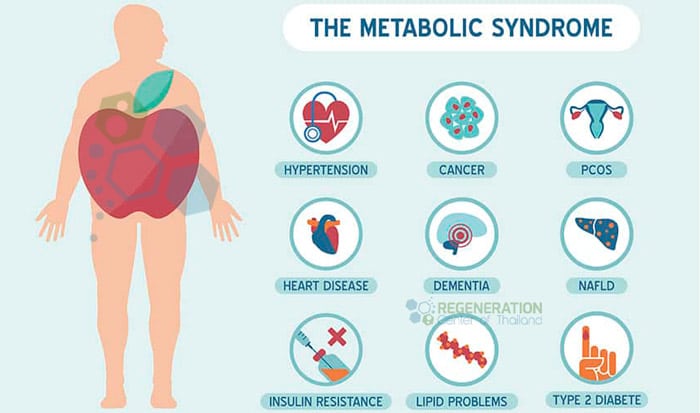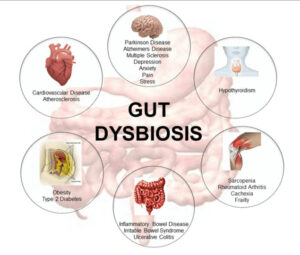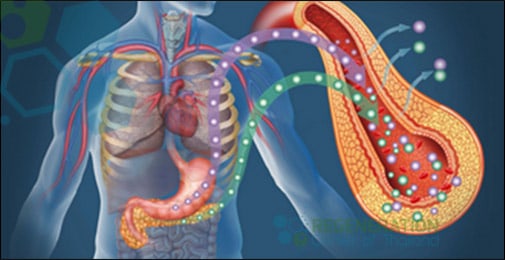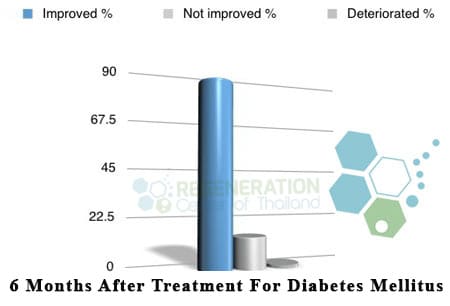Metabolic diseases are a group of disorders that affect the body’s ability to process and utilize energy from food. If left untreated, these conditions can lead to serious health complications. The Regeneration Center offers various types of solutions for metabolic diseases, depending on their causes and current symptoms.
What are Metabolic Diseases?
Metabolic diseases are a collection of disorders that disrupt the normal functioning of the body’s metabolism. Metabolism refers to the chemical processes that occur within the body to convert food into energy. When these processes are impaired, it can lead to an accumulation of toxic substances or a deficiency of essential nutrients, resulting in various health problems [1]. 
Types of Metabolic Disorders
There are several types of metabolic diseases, each affecting different aspects of metabolism. Some of the most common metabolic diseases include:
- Type 2 Diabetes mellitus: A condition characterized by high blood sugar levels due to the body’s inability to produce or utilize insulin effectively.
- Type 1 Diabetes
- Obesity: An excessive accumulation of body fat that can lead to various health complications.
- Metabolic syndrome: A cluster of conditions, including high blood pressure, high blood sugar, excess body fat, and abnormal cholesterol levels, that increase the risk of heart disease, strokes, liver disease, CHF, heart attacks, and autoimmune diseases such as FMS and Hashimotos.
- Gaucher disease is a genetic disorder that affects the body’s ability to break down fatty substances, accumulating them in various organs.
- Hemochromatosis:
- Batten Disease – Neuronal Ceroid Lipofuscinosis
- Gunther’s Disease – Congenital Erythropoietic Porphyria
- Krabbe Disease
- Hunter Syndrome (MPS-II)
- Hurler Syndrome (MPS-IH)
- Lesch-Nyhan Syndrome
- Maroteaux-Lamy Syndrome (MPS-VI)
- Mannosidosis
- Metachromatic Leukodystrophy
- Mucolipidosis II (I-cell Disease)
- Niemann-Pick Disease
- Sandhoff Disease
- MPS-III – Sanfilippo Syndrome
- MPS-IS – Scheie Syndrome
- MPS-VII – Sly Syndrome
- Tay Sachs Disease
- Wolman Disease
- X-linked Adrenoleukodystrophy
Causes of Metabolic Diseases
 The causes of metabolic diseases are diverse and complex, often involving a combination of genetic, environmental, and lifestyle factors. Genetic predisposition plays a significant role in the development of certain metabolic diseases, such as inherited disorders like phenylketonuria or familial hypercholesterolemia. Mutations in specific genes can lead to defects in enzymes or proteins essential for proper metabolic function. However, not all individuals with genetic predispositions will develop metabolic diseases, as environmental and lifestyle factors also contribute to disease onset and progression [2]. Obesity, often resulting from excessive calorie intake and insufficient physical activity, is a significant risk factor for several metabolic diseases, including type 2 diabetes, metabolic syndrome, and dyslipidemia. The accumulation of excess body fat, particularly visceral fat around the abdominal organs, can lead to insulin resistance, chronic inflammation, and alterations in lipid metabolism. Unhealthy dietary habits, such as high intake of saturated and trans fats, refined carbohydrates, and added sugars, can further exacerbate metabolic dysfunction. Sedentary behavior and lack of regular physical activity also contribute to developing metabolic diseases. Exercise helps maintain a healthy weight, improves insulin sensitivity, and promotes cardiovascular health. Other lifestyle factors, such as smoking, excessive alcohol consumption, and chronic stress, can also disrupt metabolic balance and increase the risk of metabolic diseases. Environmental toxins and certain medications, such as glucocorticoids or antipsychotics, can also interfere with metabolic processes and contribute to the development of metabolic disorders. Endocrine disruptors, chemicals that mimic or block hormones, have been linked to obesity, diabetes, and other metabolic problems. Some of the most common causes of metabolic disease include:
The causes of metabolic diseases are diverse and complex, often involving a combination of genetic, environmental, and lifestyle factors. Genetic predisposition plays a significant role in the development of certain metabolic diseases, such as inherited disorders like phenylketonuria or familial hypercholesterolemia. Mutations in specific genes can lead to defects in enzymes or proteins essential for proper metabolic function. However, not all individuals with genetic predispositions will develop metabolic diseases, as environmental and lifestyle factors also contribute to disease onset and progression [2]. Obesity, often resulting from excessive calorie intake and insufficient physical activity, is a significant risk factor for several metabolic diseases, including type 2 diabetes, metabolic syndrome, and dyslipidemia. The accumulation of excess body fat, particularly visceral fat around the abdominal organs, can lead to insulin resistance, chronic inflammation, and alterations in lipid metabolism. Unhealthy dietary habits, such as high intake of saturated and trans fats, refined carbohydrates, and added sugars, can further exacerbate metabolic dysfunction. Sedentary behavior and lack of regular physical activity also contribute to developing metabolic diseases. Exercise helps maintain a healthy weight, improves insulin sensitivity, and promotes cardiovascular health. Other lifestyle factors, such as smoking, excessive alcohol consumption, and chronic stress, can also disrupt metabolic balance and increase the risk of metabolic diseases. Environmental toxins and certain medications, such as glucocorticoids or antipsychotics, can also interfere with metabolic processes and contribute to the development of metabolic disorders. Endocrine disruptors, chemicals that mimic or block hormones, have been linked to obesity, diabetes, and other metabolic problems. Some of the most common causes of metabolic disease include:
- Genetic mutations: Certain genetic mutations can impair the body’s ability to produce enzymes necessary for normal metabolic processes.
- Poor diet: A diet high in processed foods, saturated fats, and added sugars can contribute to the development of metabolic disorders.
- Lack of physical activity: A sedentary lifestyle can lead to weight gain and insulin resistance, increasing the risk of metabolic diseases.
- Hormonal imbalances: Hormonal disorders, such as hypothyroidism or polycystic ovary syndrome (PCOS), can disrupt metabolism and lead to weight gain and other metabolic issues.
Symptoms of Metabolic Disorders
The symptoms of metabolic diseases can vary depending on the specific disorder and its severity. However, some common symptoms include:
- Excessive thirst and frequent urination
- Unexplained weight gain or loss
- Fatigue and weakness
- Abdominal pain and bloating
- Irregular menstrual cycles in women
- Darkening of skin in certain areas (acanthosis nigricans)
Diagnosing Metabolic Diseases
Diagnosing metabolic diseases typically involves a combination of physical examinations, blood tests, and imaging studies. Some standard diagnostic tests include:
- Fasting blood sugar test: Measures blood sugar levels after an overnight fast to detect diabetes.
- Lipid profile: Assesses levels of cholesterol and triglycerides in the blood.
- Thyroid function tests: Evaluate the functioning of the thyroid gland, which plays a crucial role in regulating metabolism.
- Genetic testing: Identifies specific genetic mutations that may be responsible for inherited metabolic disorders.
Preventing Metabolic Diseases
While some metabolic diseases have a vital genetic component, lifestyle changes can prevent or manage many. Some tips for preventing metabolic diseases include:
- Maintaining a healthy weight through a balanced diet and regular exercise
- Limiting intake of processed foods, saturated fats, and added sugars
- Staying hydrated and limiting alcohol consumption
- Managing stress through relaxation techniques and adequate sleep
- Regularly monitoring blood sugar, blood pressure, and cholesterol levels
Traditional Treatments for Metabolic Diseases
Treatment for metabolic diseases depends on the specific disorder and its underlying cause. Traditional treatments for metabolic diseases vary depending on the particular condition. For diabetes,  medications such as metformin, sulfonylureas, GLP-1 receptor agonists, and DPP-4 inhibitors are used to lower blood sugar levels. Insulin therapy is necessary for type 1 diabetes and some cases of type 2 diabetes. Lifestyle modifications, including reducing carbohydrate and sugar intake, regular exercise, and blood glucose monitoring, are also crucial in managing diabetes. In the case of dyslipidemia (high cholesterol/triglycerides), statins are commonly prescribed to lower LDL cholesterol, while fibrates, niacin, and omega-3 fatty acids are used to lower triglycerides. Bile acid sequestrants may also be used to lower LDL cholesterol. Dietary changes, such as reducing saturated fat, trans fat, cholesterol intake, regular aerobic exercise, and weight loss, are crucial in managing dyslipidemia. Metabolic syndrome is primarily treated through lifestyle changes to lose 7-10% of body weight if the individual is overweight or obese. This can be achieved through 150+ minutes/week of moderate-intensity exercise and a diet rich in fruits, vegetables, whole grains, fish, and lean proteins while low in added sugars and unhealthy fats. If lifestyle changes are insufficient, medications may be prescribed to treat individual risk factors, such as high blood pressure, high blood sugar, or dyslipidemia. For obesity, sustained lifestyle modification involving diet, exercise, and behavior changes is the primary approach to achieve a 5-10% weight loss. Medications like orlistat, phentermine, and GLP-1 receptor agonists may be used as an adjunct to lifestyle changes, while bariatric surgery is an option for severe cases. Some standard treatment approaches include:
medications such as metformin, sulfonylureas, GLP-1 receptor agonists, and DPP-4 inhibitors are used to lower blood sugar levels. Insulin therapy is necessary for type 1 diabetes and some cases of type 2 diabetes. Lifestyle modifications, including reducing carbohydrate and sugar intake, regular exercise, and blood glucose monitoring, are also crucial in managing diabetes. In the case of dyslipidemia (high cholesterol/triglycerides), statins are commonly prescribed to lower LDL cholesterol, while fibrates, niacin, and omega-3 fatty acids are used to lower triglycerides. Bile acid sequestrants may also be used to lower LDL cholesterol. Dietary changes, such as reducing saturated fat, trans fat, cholesterol intake, regular aerobic exercise, and weight loss, are crucial in managing dyslipidemia. Metabolic syndrome is primarily treated through lifestyle changes to lose 7-10% of body weight if the individual is overweight or obese. This can be achieved through 150+ minutes/week of moderate-intensity exercise and a diet rich in fruits, vegetables, whole grains, fish, and lean proteins while low in added sugars and unhealthy fats. If lifestyle changes are insufficient, medications may be prescribed to treat individual risk factors, such as high blood pressure, high blood sugar, or dyslipidemia. For obesity, sustained lifestyle modification involving diet, exercise, and behavior changes is the primary approach to achieve a 5-10% weight loss. Medications like orlistat, phentermine, and GLP-1 receptor agonists may be used as an adjunct to lifestyle changes, while bariatric surgery is an option for severe cases. Some standard treatment approaches include:
- Lifestyle modifications: Adopting a healthy diet, regular exercise, and maintaining a healthy weight can help manage many metabolic disorders.
- Medications: Prescription medications, such as insulin for diabetes or statins for high cholesterol, can help regulate metabolic processes and manage symptoms.
- Enzyme replacement therapy: For certain genetic metabolic disorders, such as Gaucher’s disease, enzyme replacement therapy can help restore normal metabolic function.
- Surgery: In severe cases of obesity, bariatric surgery may be recommended to facilitate weight loss and improve metabolic health.
Inherited metabolic disorders, such as phenylketonuria and maple syrup urine disease, require highly specialized diets that restrict the intake of components that cannot be metabolized. Supplements of vitamins, minerals, and amino acids that may be deficient are also necessary. Some disorders may be treated with enzyme replacement therapy, while severe cases may lead to kidney failure and require dialysis or organ transplantation. Regular follow-up with healthcare providers is crucial for all metabolic diseases to monitor treatment response and disease progression.
Stem Cell Therapy: A Promising New Approach to Metabolic Disorders
Metabolic disorders, such as diabetes, obesity, and metabolic syndrome, affect millions of people worldwide [3]. These conditions can lead to serious health complications and significantly impact an individual’s quality of life. While traditional treatments, including lifestyle modifications and medications, can help manage these disorders, stem cell researchers have helped develop biological therapy as a novel approach to treating metabolic diseases.
What are Stem Cells?
Stem cells are unspecialized cells that have the unique ability to develop into various types of specialized cells in the body. They can divide and renew themselves, making them a valuable tool in regenerative medicine. There are two main types of stem cells: embryonic stem cells, which are derived from early-stage embryos, and adult stem cells, which are found in various tissues throughout the body. The Regeneration Center does not offer embryonic stem cells, and our treatments call for mesenchymal stem cells from umbilical cord tissue, Wharton’s jelly, placenta, or adipose tissue.
Stem Cell Treatment for Metabolic Disorders in 2025
How Can Mesenchymal Stem Cells Help Treat Metabolic Syndrome?
Stem cell therapy for metabolic disorders and chronic diseases aims to replace or regenerate damaged or dysfunctional cells in the body. In the case of diabetes, for example, stem cells could be used to create insulin-producing beta cells, which are destroyed or impaired in individuals with the condition. By restoring the body’s ability to produce insulin, stem cell therapy could provide a long-term solution for managing diabetes stem cells, increase the natural production of β cells, and improve glucose homeostasis. In obesity and metabolic syndrome, stem cell therapy may help regenerate damaged tissues, such as the liver or pancreas, which play crucial roles in metabolism. Additionally, mesenchymal stromal cells, hematopoietic stem cells & adipose-derived stem cells can be used to create brown adipose tissue (BAT), a type of fat that burns energy and helps regulate body weight [4].
Current Research, Clinical Applications, and Clinical Trials
Several studies and clinical trials are currently investigating the safety and efficacy of stem cell therapy for metabolic disorders. Some promising results have been accomplished in functional medicine. Stem cell transplantation has led to immunomodulation, improved insulin production, reduced inflammation, and enhanced tissue regeneration. In human clinical trials, stem cell therapy has shown positive results in treating type 1 diabetes. Patients who received stem cell transplants experienced improved blood sugar control and reduced insulin requirements. Due to the complex challenges of using pluripotent stem cells in metabolic disorders, more extensive and longer-term studies are needed to fully assess the safety and long-term efficacy of the new approaches [5].
Challenges and Future Directions
 While stem cell treatment of metabolic disorders holds great promise for treating metabolic disorders, there are still several challenges to overcome. One of the main concerns is the potential for stem cells to develop into unintended cell types or form tumors. Doctors and researchers are working to develop strategies to ensure the safety and stability of stem cell transplants. Another challenge is the large-scale production of high-quality stem cells for therapeutic use. Advances in cell culturing techniques and biomanufacturing processes are essential to make stem cell therapy more accessible and cost-effective.
While stem cell treatment of metabolic disorders holds great promise for treating metabolic disorders, there are still several challenges to overcome. One of the main concerns is the potential for stem cells to develop into unintended cell types or form tumors. Doctors and researchers are working to develop strategies to ensure the safety and stability of stem cell transplants. Another challenge is the large-scale production of high-quality stem cells for therapeutic use. Advances in cell culturing techniques and biomanufacturing processes are essential to make stem cell therapy more accessible and cost-effective.
Treating Metabolic Diseases with Stem Cells
The cellular treatment for metabolic conditions will require a minimum of 10-12 days in Bangkok. The costs of treating patients with metabolic disease will depend on many factors, including current health and other underlying medical conditions. Our medical team must review patients’ relevant medical information, tests for risk variants, and recent blood tests to prepare better. Upon approval, a detailed treatment recommendation will be provided that includes all medical related costs including stem cell extractions, expansion counts, expectations after treatment depending on stage and severity, To learn more please contact us today.
Published Clinical Citations
[1] ^ Wasant P, Svasti J, Srisomsap C, Liammongkolkul S. Inherited metabolic disorders in Thailand. J Med Assoc Thai. 2002 Aug;85 Suppl 2:S700-9. PMID: 12403250.
[2] ^ Rattanatham R, Tangpong J, Chatatikun M, Sun D, Kawakami F, Imai M, Klangbud WK. Assessment of eight insulin resistance surrogate indexes for predicting metabolic syndrome and hypertension in Thai law enforcement officers. PeerJ. 2023 May 29;11:e15463. doi: 10.7717/peerj.15463. PMID: 37273533; PMCID: PMC10234272.
[3] ^ Saklayen MG. The Global Epidemic of the Metabolic Syndrome. Curr Hypertens Rep. 2018 Feb 26;20(2):12. doi: 10.1007/s11906-018-0812-z. PMID: 29480368; PMCID: PMC5866840.
[4] ^ Hu W, Lazar MA. Modelling metabolic diseases and drug response using stem cells and organoids. Nat Rev Endocrinol. 2022 Dec;18(12):744-759. doi: 10.1038/s41574-022-00733-z. Epub 2022 Sep 7. PMID: 36071283; PMCID: PMC9449917.
[5] ^ Huang X, Liu Y, Li Z, Lerman LO. Mesenchymal Stem/Stromal Cells Therapy for Metabolic Syndrome: Potential Clinical Application? Stem Cells. 2023 Oct 8;41(10):893-906. doi: 10.1093/stmcls/sxad052. PMID: 37407022; PMCID: PMC10560401.


